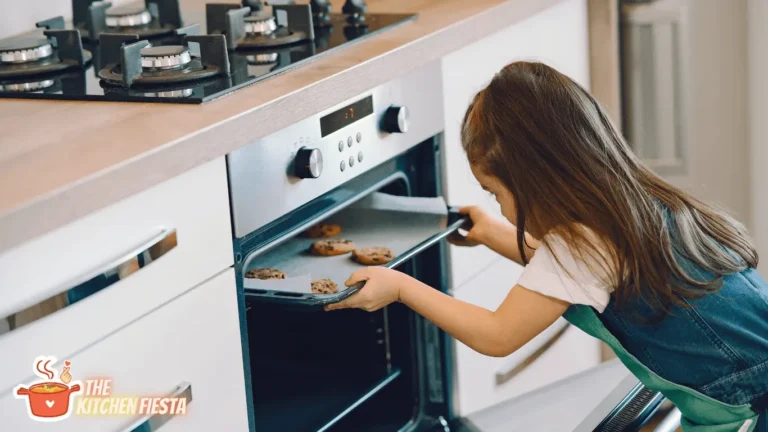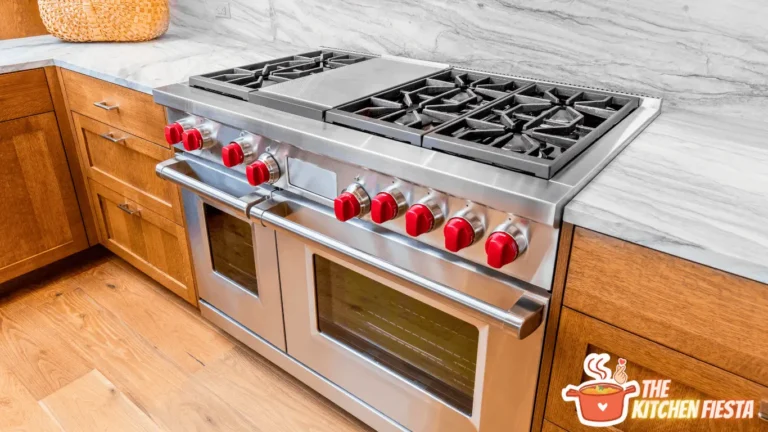Can Electric Stoves Explode? Causes & Prevention of Electric Stove Fires

Cooking meals at home comes with its fair share of risks – from minor burns to more serious kitchen fires. If you use an electric stove, you may wonder just how likely it is to cause an explosion. After all, electricity and fire don’t seem like a safe combination!
Can electric stoves explode? The short answer is yes, electric stoves can explode – but it’s relatively rare. With proper precautions and stove maintenance, you’re unlikely to experience anything more dangerous than some smoke from an overheated appliance.
In this comprehensive guide, we’ll cover everything you need to know about electric stove explosions, including:
- What causes electric stoves to catch fire or explode
- Warning signs of an impending electric stove explosion
- Electric stove explosion statistics and risks compared to gas stoves
- Tips to prevent your electric stove from exploding
- What to do if your electric stove does catch fire or explode
- When to call the fire department
- How to inspect and maintain your electric stove
- Replacing faulty electric stove parts
- Vital electric stove safety tips
So unplug your crockpot, turn off the gas, and keep reading to get the full scoop on electric stove explosion dangers!
What Causes an Electric Stove Explosion?
Electric stoves rely on heating elements to generate high heat for cooking. For stovetop burners, this is usually a circular metal coil. In the oven, it’s typically a flat panel heating element made of metal or ceramic.
These heating elements allow the appliance to quickly reach temperatures of several hundred degrees. The coils get especially hot, glowing red when turned on.
Such extreme heat can lead to explosions or fires in a few different ways:
- Overheating: If a burner or oven heating element malfunctions and cannot turn off, it may overheat to the point of starting a fire. This overheating can happen if the stove’s wiring has an electrical malfunction.
- Unattended cooking: If a stovetop burner or oven is left unattended on a high heat setting for an extended period, it can overheat cookware to the point of burning. Unattended oil can easily ignite at high temps.
- Loose or damaged parts: If a coil, wiring, or other stove part comes loose or gets damaged, it may spark, overheat, and start a fire. A faulty heating element that can’t properly regulate its temperature can also overheat.
- Trapped heat: If the oven or area around a stovetop burner cannot properly ventilate excess heat, component parts may overheat and ignite, especially if blocked by something flammable.
- Electrical issues: Problems with wiring like shorts or faulty connections can allow too much electric current to flow to the heating elements, leading them to overheat.
So in summary, the combination of high heat generation and electrical components makes both overheating and electrical malfunctions prime causes of electric stove fires and explosions.
Do Electric Ovens Explode Like Stovetops?
Electric ovens carry the same explosion risks as stovetop burners. The key factors are overheated or faulty heating elements and poor ventilation.
However, there are a few reasons why electric oven explosions are less common:
- Ovens are better insulated than stovetops. This helps moderate interior oven temperatures.
- Ovens don’t rely on exposed coils that can be easily damaged or come in direct contact with flammables.
- There is less risk of unintended flammable material (like oil or food packages) ending up directly on top of the oven’s heating element.
So while it is possible for an electric oven to overheat or short circuit leading to an explosion, open burners on a stovetop see higher use and pose more risks overall. Always keep both parts of an electric stove well maintained and free of nearby flammables.
How Do Electric Stovetops Catch Fire or Explode?
Electric stovetops are more prone to fires and explosions than ovens because their burner coils openly generate extreme heat. Here are a few ways fires commonly start on electric stovetops:
- Overheated cookware: Pots or pans left empty or with oil/grease can quickly scorch and ignite if cooked at high temperatures. This can spread to the stove.
- Damaged coils: If a coil isn’t properly attached or becomes warped/loose, it may arc and spark as electricity flows to it. This sparks can ignite the stove or surrounding items.
- Spills: Grease, oil, or plastic/foil spill onto a hot burner can easily ignite. Food residue and spills on a stovetop can also catch fire over time.
- **Blocked ventilation:**If the stovetop area has poor air circulation, burners must work harder leading to overheating. Heat and sparks can ignite nearby combustibles.
- Unattended cooking: Turning on a burner then leaving it unattended is a common cause of fires. A simple stove coil generates up to 1500°F – more than enough to ignite many common kitchen items if left on.
To sum it up, the exposed high heat of an electric stove’s coils lead to a higher fire risk if they are damaged, mishandled, or cannot properly disperse heat away from the burner’s location. Keeping cookware and spills away from hot coils is key.
What Are the Warning Signs of an Impending Electric Stove Explosion?
Being alert to the warning signs of a potential electric stove fire can help you take quick action to avoid injury or major appliance damage. Here are some key signs of danger:
- Smoke or unusual burning smell: This likely means food or grease residue is burning on a stove heating element. Smoke means a fire has already ignited.
- Visible sparks: This may occur if a burner coil is damaged or has come loose and is arcing. Sparks signify a short circuit.
- Odd sounds: Popping or buzzing noises from a burner may indicate an electrical issue like a short circuit.
- Power fluctuations: Burners that seem to pulse brightness, blow breakers, or cause lights to dim could signal a problem with the stove’s wiring.
- Unusually high heat: If a burner or oven seems hotter than the setting it’s on, it could be overheating.
- Faulty burner controls: If a burner won’t turn on or off as expected, it likely has an electrical issue causing it to overheat without shutting off.
Don’t ignore these warning signs! Act quickly to turn off the stove and have it serviced. Leaving a potential problem to worsen could allow the stove to exceed safe temperatures.
How Long Does it Take for an Electric Stove to Explode?
If an electric stove experiences an overheating component or electrical malfunction, at what point might it transition from functional appliance to explosive hazard?
The answer depends on these factors:
- Problem severity: Minor issues like a slightly arcing burner may only cause issues over months. But major electrical shorts can make a stove explode in seconds.
- Location of flammables: An electric stove will ignite surrounding items like packaging or paper towels more quickly than ceramic stove surfaces.
- Ventilation: Well ventilated stoves allow heat to dissipate instead of being trapped near heating elements. Poor ventilation accelerates overheating.
- Use of stove: A frequently used stove that sees spills and high heat will likely overheat faster than gently used appliances.
- Maintenance: Stoves with clogged vents or lax maintenance have higher chances of slowly developing shorts over time.
With the right unfortunate combination of these factors, some electric stoves could explode within 5-10 minutes of a burner or oven heating element spiraling out of control. But it takes time for an appliance to reach such dangerous states if you stay aware of warning signs.
Don’t leave a questionable stove unattended – seek repairs at the first signs of abnormal function. This will virtually eliminate any risk of explosions.
Are Electric Stoves More Prone to Fires and Explosions Than Gas Stoves?
Many homeowners assume that with open flames and gas lines, gas stoves must carry greater fire and explosion risk than electric varieties. But is this actually true?
Electric stoves have a slightly higher risk of fires according to fire incident statistics:
- Fires originating with electric stoves/ovens: 8,800 annual average
- Fires originating with gas stoves/ovens: 8,500 annual average
The numbers are fairly close. And there are pros and cons regarding fire safety for both electric and gas stove varieties:
Electric stove fire pros:
- No open flames – only heat and sparks present lower ignition risks
- Electric stoves are generally well-insulated to retain heat efficiently
Electric stove fire cons:
- Exposed heating coils on stovetops are vulnerable to spills and damage
- Electrical shorts can easily make elements overheat quickly
Gas stove fire pros:
- Newer gas stove models have more temperature regulation sensors than electric
- Gas releases and burns up quickly rather than potentially smoldering
Gas stove fire cons:
- Open gas flames obviously present ignition risks
- Gas leaks are highly flammable and explosive
So while gas stoves avoid some risks like electrical shorts, they introduce other fire hazards not present with electric. There’s no definitive “safest” stove type. Taking proper precautions is essential no matter what kind of stove you cook with.
What Makes Electric Stoves Safer Than Gas Stoves?
Even though electric stoves aren’t 100% safer, they do avoid two of the biggest risks of gas stoves – open flames and gas line leaks.
- No open flames means less chance of igniting nearby food or packaging. Hot burners primarily just heat the cookware.
- Electric stoves eliminate the hazard of gas leaks or ruptured fuel lines. There’s no need to rely on combustible gas piped throughout your kitchen.
Furthermore, some design factors contribute to electric stove safety:
- Advanced designs use ceramic glass cooktops without exposed hot coils. This removes vulnerability to spills and damage.
- Electric ovens tend to have heavy-duty insulation and tight door seals to maintain even heating. This reduces risks of fires inside.
- Many electric stoves have timer shut-offs to turn off unattended burners or ovens after a set duration. This prevents most overheating dangers.
Overall, electric stoves isolate their extreme heat generation to insulated metal heating elements. Compared to the exposed dangers of gas flames and leaks, this makes electric varieties inherently less prone to fires.
Tips to Prevent Your Electric Stove From Exploding
While electric stove explosions are rare with proper stove operation and maintenance, it never hurts to exercise some extra caution with your cooking appliance. Here are tips to minimize the risk of explosions or fires:
- Never leave cooking food unattended for more than a minute or two. Stay nearby to handle boilovers, detect odd smells, and turn off burners.
- Avoid cooking on high heat settings unless necessary. Use oils with high smoke points for high-heat cooking to avoid igniting oil.
- Clean drip pans frequently to avoid grease buildup near heating elements. Burnt grease on a hot burner can easily ignite.
- Check for damage to coils and repair immediately. Damaged coils are prone to sparking and can overheat.
- Don’t allow flammables like towels or food packaging near burners. Keep the stovetop clear.
- Double check that burners are turned off when done cooking. verifies that the stove won’t overheat.
- Have a small fire extinguisher handy in case of emergencies. Know how to use it properly as well.
- Inspect your electric stove often, checking for any wear on wiring or odd smells that could indicate overheating components.
Paying close attention to the state of your electric stove burners and not leaving cooking food unattended are two of the most effective ways to prevent dangerous overheating.
What To Do If Your Electric Stove Catches Fire or Begins to Explode?
If you notice your electric stove is on fire, smoking heavily, sparking excessively, or making odd noises indicative of explosions, follow these steps:
- Turn off the power supply to your stove if possible. This may mean flipping the circuit breaker for the kitchen or unplugging the unit if you can safely reach it.
- Evacuate everyone from the kitchen immediately. Do not try to remove pans or access the stove.
- Close the door when exiting to help contain the fire.
- Call emergency services. Electrical and stove fires can restart easily, so professional fire response is needed.
- Only attempt to use a fire extinguisher if the fire is small and contained to one burner, and you can safely reach the stove. The risk is often not worth it.
- Wait for emergency crews at your planned gathering spot outside and provide details on the situation. Do not try to re-enter a smoking, burning kitchen.
Your #1 priority is getting out safely – damaged appliances can be replaced. Be ready to evacuate quickly if you ever detect signs of smoke or fire around your electric stove.
When to Call the Fire Department for an Electric Stove Fire?
Given that stovetop grease fires are common minor incidents, how can you discern when an electric stove fire truly warrants calling emergency services versus handling it yourself?
The National Fire Protection Association outlines that fire crews should be called for any fires involving:
- Unattended cooking that has ignited
- Grease or electrical fires, even if small in nature
- Inability to safely reach the appliance controls or electrical plug
- Unsuccessful attempts at suppressing the fire with an extinguisher
- Any smoky conditions making it difficult to breathe
- Rapid spread of flames beyond the initial source
- Concern about dangers like appliances tipping or sparks near chemicals
Basically, if a stove fire progresses at all beyond your immediate control or causes you safety concerns, do not hesitate to call 911. Electric and grease fires can flare up suddenly and make conditions lethal. Let professionals handle any questionable stove-related fires.
Inspecting and Maintaining Your Electric Stove to Prevent Explosions
To keep risks minimal, add these quick electric stove inspections and cleaning steps to your regular kitchen routine:
- Wipe down cooktop surfaces to remove any spilled on food residue after each use.
- Check for cracks/damage to cooktops and all heating elements monthly.
- Remove and hand wash knobs to prevent buildup of grime or food around burner controls.
- Vacuum ventilation openings on oven back panels once per month to allow airflow.
- Keep oven free of clutter and excess grease. Clean walls with oven degreaser every 2-3 months.
- Check oven gaskets for wear/damage and replace worn ones to prevent hot air leaks.
- Inspect wiring behind or under stove for signs of damage like frayed covers or burnt spots.
Regularly cleaning and inspecting an electric stove takes little time and can prevent many issues leading to dangerous overheating.
Replacing Faulty Parts on Electric Stoves
If your stove inspection reveals any faulty parts in need of replacement, address these immediately to keep your appliance safe. Common replacements include:
- Broken/jammed burner knobs – Ensure knobs fully adjust settings and turn on/off burners.
- Cracked or damaged stove burners – Replace broken coils/elements so they heat surfaces evenly.
- Malfunctioning heating elements or thermostats – Replace any elements not heating properly to prevent overheating risks.
- Damaged power cords – Frayed/cracked cords can arc, short circuit, and present shock hazards.
- Broken oven interior lights – Replace burnt out lights so you can monitor food cooking.
Only use manufacturer approved replacement parts meant for your specific electric stove model When in doubt, call in a professional technician for any repairs needed.
Electric Stove Safety Tips to Keep in Mind
Beyond preventative maintenance and avoiding unattended cooking, keep these vital electric stove safety guidelines in mind whenever you’re preparing meals:
- Always turn pot and pan handles inward to avoid accidental spills onto burners
- Keep a small fire extinguisher accessible in case of emergencies
- Ensure good ventilation by operating the stove’s exhaust fan while cooking
- Never store flammable items like paper towels, boxes, or spices near your stove burners
- Keep pets and children away from the stove area to avoid accidental burns
- Avoid wearing loose fitting clothing that could drape onto a hot burner
- Double check that all stove controls are turned fully off when cooking is complete
Staying alert to general kitchen and stove safety will help minimize risks as you cook delicious meals for your family.
Conclusion: Key Takeaways on Electric Stove Explosions
While any electrical appliance that generates high heat presents some risk, you can cook safely on your electric stove by heeding these tips:
- Electric stoves can explode if heating elements overheat or experience electrical shorts
- Stovetops see more fires than ovens since their coils are openly exposed
- Warning signs like odd sounds, smoke, or high heat warrant immediate appliance shutdown
- Poor ventilation and unattended cooking are leading causes of dangerous overheating
- Electric stoves see slightly more fires than gas, but avoid some open flame risks
- Regular cleaning and maintenance vastly reduce likelihood of explosions
- If a fire does occur, evacuate immediately and call emergency services
- Avoid unattended cooking, and keep flammables away from burners
Taking sensible precautions allows electric stove owners to enjoy all the advantages of this popular appliance while avoiding needless risks. Use your stove knowledge to prevent fires and keep your kitchen safe as you whip up delicious recipes for years to come!






